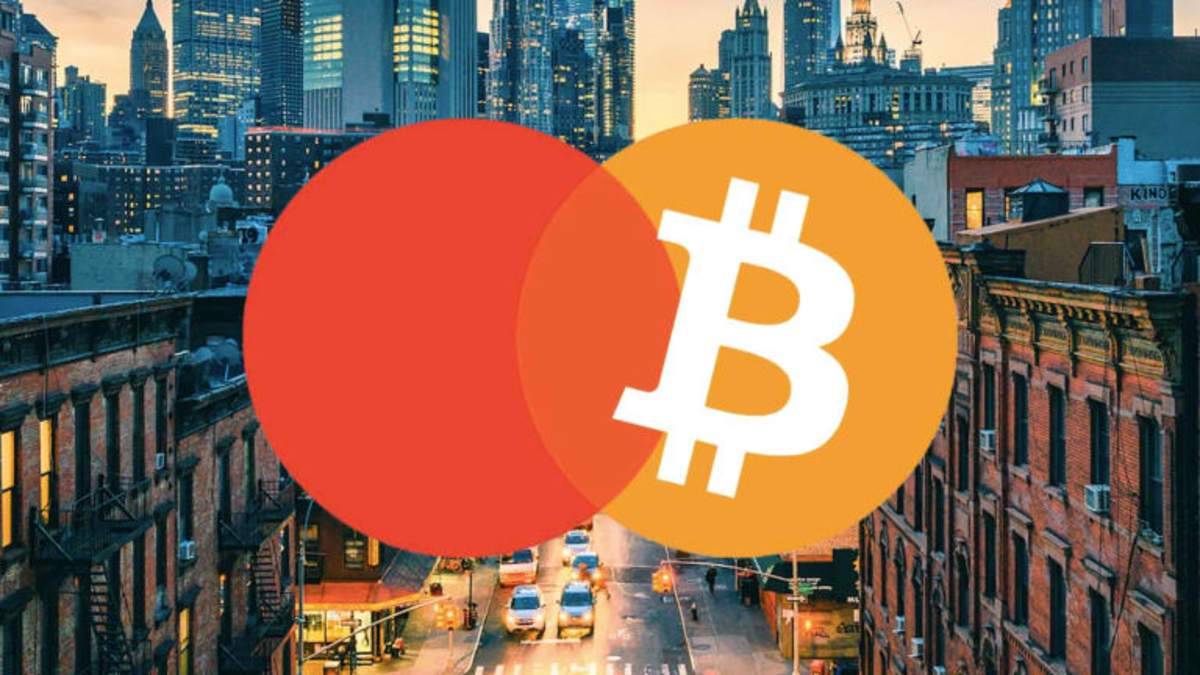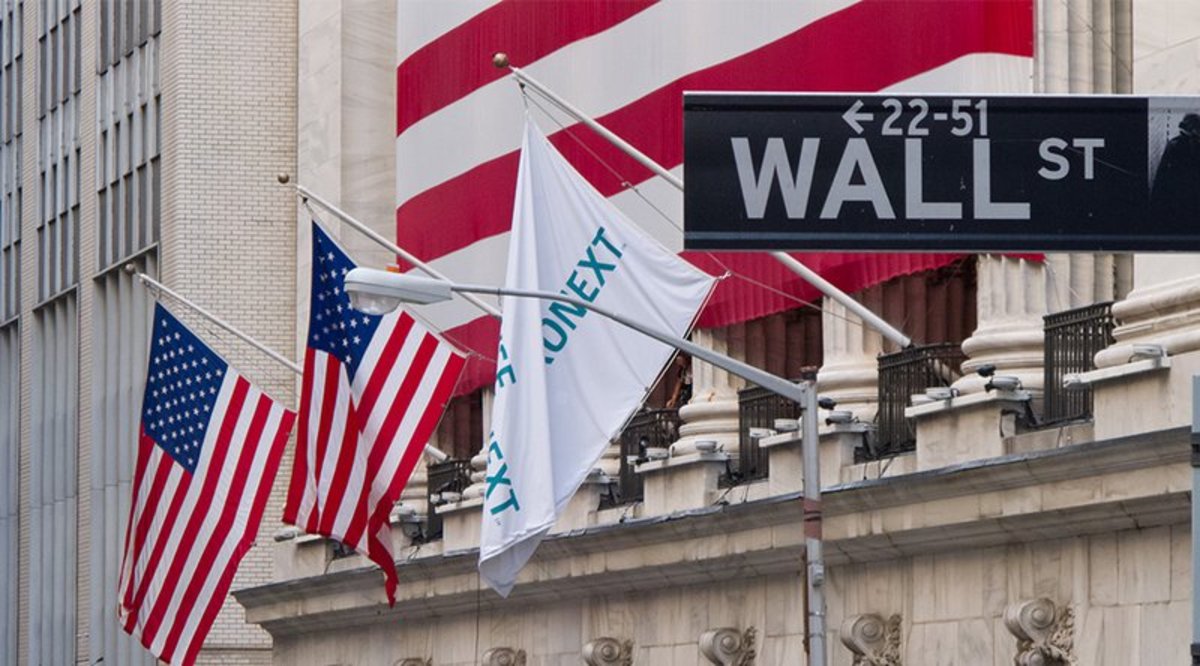Month: May 2024
Dollar steadies ahead of U.S. growth, inflation data
Post Content
Dollar rebounds as equities dip, eyes on Treasury auctions
Post Content
Asia FX weak, dollar at over 2-week high before more rate, inflation cues
Post Content
Yen hits 4-week low, dollar up ahead of key inflation data
Post Content
Mastercard Crypto Credential Launches with “First Peer-to-Peer Pilot Transactions”
Mastercard has launched its Mastercard Crypto Credential, enabling its “first peer-to-peer (P2P) pilot transactions” using aliases instead of long and complex blockchain addresses. This new system aims to simplify cryptocurrency transactions for exchange users, offering a more user-friendly approach.
Mastercard Crypto Credential verifies interactions among consumers and businesses using blockchain networks, ensuring users meet a set verification standards, set by Mastercard, and confirming the recipient’s wallet supports the transferred asset.
JUST IN: Mastercard Crypto Credential launches its “first peer-to-peer pilot transactions”, partners with exchange Mercado #Bitcoin 👀 pic.twitter.com/Xt6nbqV5XA
— Bitcoin Magazine (@BitcoinMagazine) May 29, 2024
“Mastercard continues to invest in its technology, standards and partnerships to bring safe, simple and secure payments to the forefront,” said Mastercard Executive Vice President of Product and Engineering in Latin America and the Caribbean, Walter Pimenta. “As interest in blockchain and digital assets continues to surge in Latin America and around the world, it is essential to keep delivering trusted and verifiable interactions across public blockchain networks. We’re thrilled to work with this dynamic set of partners to bring Mastercard Crypto Credential closer to realizing its full potential.”
The live transaction capabilities are initially enabled on the Bit2Me, Lirium, and Mercado Bitcoin exchanges, aiming to facilitate transactions between Latin American and European corridors. Users in Argentina, Brazil, Chile, France, Guatemala, Mexico, Panama, Paraguay, Peru, Portugal, Spain, Switzerland, and Uruguay can now send cross-border and domestic transfers across multiple currencies and blockchains, according to the announcement.
Mastercard said the system also supports the exchange of Travel Rule information for cross-border transactions, a regulatory requirement to attempt to prevent illegal activities. The P2P transaction is the first of many use cases that Mastercard Crypto Credential aims to support, with potential applications extending to NFTs, ticketing, and other payment solutions depending on market and compliance requirements, the announcement stated.
“Mercado Bitcoin is proud to partner with Mastercard on its groundbreaking Crypto Credential pilot,” said Mercado Bitcoin Owner, Roberto Dagnoni. “As a Latin American leader in innovative blockchain solutions, such as real-world assets and the Brazilian CBDC, we believe in Mastercard’s initiative and its potential to pave the way for a faster future of global financial transactions.”
The credit card company said that a select group of crypto wallet users will leverage Mastercard Crypto Credential on a first-come, first-serve basis, and that wider availability will become available over the coming months to more than 7 million users across the participating exchanges.
Bitcoin: A New Hope for Innovators in Corrupt Economies
In a world where “talent is everywhere, opportunity is not,” the existing fiat monetary system perpetuates the divide between those with access and resources those without. Even in democratic societies, which have their own flaws, people generally enjoy stable currencies, freedom, and rule of law. These features create an environment rich with opportunities, where a person’s start in life doesn’t have to dictate where they end up.
Bitcoin advocate and bestselling author Lyn Alden is a prime example of overcoming obstacles and taking advantage of the opportunities afforded by democratic societies. Despite experiencing homelessness for several years, she worked her way up to become a well-known figure in financial circles. Her story is not unique; many refugees fleeing war and persecution have found ways to adapt, innovate, and thrive in new lands, contributing significantly to their adopted communities.
WhatsApp co-founder Jan Koum, for example, grew up without electricity in Ukraine, and after immigrating to America he spent several years cleaning grocery stores before finally achieving success. PayPal co-founder Max Levchin has tweeted about how he found success in America after escaping persecution in Russia. “My family and I, and thousands of Soviet Jews like us, came to the US as refugees in ’91, running from a regime that persecuted us because of who we were,”. Another amazing immigrant success story is that of Mai Lee Chang, who was born in a Thai refugee camp to Vietnamese parents and only knew one English word — “restroom” — when she started school in the U.S. Chang overcame numerous obstacles and is now an engineer contributing to NASA’s journey to Mars.
However, the situation is vastly different under authoritarian regimes, where a person’s potential is often predetermined by their birth circumstances. Typically, in such places if you’re not born into a family with connections to corrupt officials—in other words, if you’re not a rich kid—your ability to innovate and your entrepreneurial spirit will be systematically suppressed. Under these regimes, the fiat system isn’t based on merit, but rather rigged in favor of such ‘crony kids.’ In other words, the systems are based on nepotism, family connections, and corruption.
In the past, when there was neither the internet nor smartphones available, the average individual living in such hostile environments simply accepted the harsh reality of being destined to serve dictators and their family members. Today, however, Bitcoin is emerging as more than just a technology; it serves as a gateway to financial empowerment without compromising moral values. It offers a powerful tool for breaking through many of the concrete barriers erected by oppressive governments.
The experience of Swan Htet Aung (Swan), an AI entrepreneur from Myanmar (formerly known as Burma), demonstrates how Bitcoin can provide a lifeline to individuals facing the harsh reality of starting from scratch without money or family connections. After founding his AI company in 2016, Swan’s startup grew quickly, and by 2020 it was generating annual revenue of over $300,000.
Highlighting the importance of Bitcoin in preserving financial health, Swan recalled a pivotal moment after the coup in February 2021. Four days after the military takeover, he withdrew his company’s cash and converted it to Bitcoin and USDT. He made this decision just a couple of weeks before banks in Myanmar began limiting withdrawals for individuals and businesses, allowing him to take control of his company’s assets. Unfortunately, his choice to keep the remaining USD assets in the banks caused him to lose a significant portion of the company’s financial assets when the Myanmar’s junta enacted an extreme new monetary policy designed to conserve USD for its war machine. The policy, issued by Myanmar’s Central Bank on April 3rd 2022, resulted in the forceful conversion of Swan’s USD reserves into Myanmar’s rapidly depreciating local currency (the Myanmar Kyat) without his consent at 30% below the market rate.
The new policy mandated that “Residents within the country must repatriate foreign currency earnings obtained from abroad to Myanmar. These earnings are to be sold and exchanged for Myanmar Kyat within one working day through banks holding Authorized Dealer (AD) licenses by opening a foreign currency account in Myanmar.”
People living in countries with more fair and just legal systems might find it difficult to comprehend such oppressive financial policies. However, Myanmar actually has a history of centralized financial institutions wielding power to suppress its citizens. A notorious example happened in 1987 when the government suddenly demonetized 25, 35, and 75 Kyat notes, effectively erasing 80% of the currency circulating in the economy overnight.
More recently, after Myanmar’s violent military coup in 2021, the Burmese military used tactics such as freezing the bank accounts of activists, journalists, and supporters of the anti-coup movement, further demonstrating the junta’s tactic of oppressing people via the fiat financial system. Unfortunately, such abusive policies are often effective in places such as Myanmar, where people are preoccupied with ensuring their physical survival, securing food for their table, and keeping a roof over their heads – leaving them with little energy or no interest to challenge or fight against injustices.
Before 2010, Myanmar had a lower mobile phone ownership rate than North Korea, and dictator Than Shwe’s regime discouraged internet use by spreading propaganda that the internet was merely a place for adult videos. By 2016, however, the landscape had changed dramatically, as social media, affordable smartphones, and cheap SIM cards had become widely accessible to the majority of the country’s population.
Initially, Myanmar entrepreneur Swan came to the U.S. at age 32 for the GenAI event hosted by AWS in San Francisco to learn and gain new experiences, intending to return to Myanmar. However, while he was in transit, the Burmese military activated a forced conscription law, drastically changing his life trajectory. This law, combined with the financial instability caused by the Central Bank’s actions, widespread socio-economic injustice, and the country’s hyper-surveillance system, prompted Swan to decide to stay longer in the U.S. He now hopes to obtain an O1-Visa to continue his work and rebuild his dream in an environment where there are more opportunities to innovate and develop. While the U.S. has its own inequalities and domestic issues, many foreigners still view it as the best destination to pursue their dreams, believing that hard work and innovation can lead to success.
In a conversation for this article, Swan recounted the early days of his startup in Yangon, Myanmar’s largest city. Along with two friends, Swan launched an AI software company in 2016, a period of time when Myanmar was undergoing significant reforms and gradually increasing its participation in the global community after over half a century of isolation.
“Human labor is cheaper in Myanmar than subscribing to software,” Swan said. “It makes sense for business owners to hire staff at a salary of $100 a month and assign them multiple tasks, whether they’re inside or outside the scope of the job, unlike a chatbot for customer service.” While AI job displacement is rising in the developed world, in developing countries sweatshop conditions and cheap labor costs will always outcompete AI, at least in places where electricity is limited and there’s zero democracy (of course, low wages and sweatshop working conditions also raise a host of ethical problems that must be addressed).
Swan then shared the early struggles of his startup, “We spent pretty much all of 2016 just developing the product because we didn’t get a single customer. I had a side job and lived with my parents in a rented apartment while the other two co-founders left to pursue other full-time opportunities.”
Swan, who speaks Burmese and English fluently, mentioned that he faced social constraints while raising funds, primarily because Myanmar is an emerging market. Additionally, there was an underlying social barrier: he had never worked abroad and held a degree from a university in Yangon. Unlike the privileged ‘crony kids’, Swan lacked a privileged background, so his start-up struggled to find investors despite generating annual revenues of $300,000 in 2020 and signing deals with over 1,000 business partners, including multinational corporations like Samsung, Unilever, Carlsberg, NIVEA, and many more.
If a protocol-based fundraising system like Bitcoin was available for entrepreneurs in the developing world, talented individuals like Swan could scale up their startups regardless of their socio-economic status or whether they have a prestigious degree.
Bitcoin may be seen as an investment asset class in the developed world or misunderstood as an environmentally damaging technology, but it represents a lifeline, money, and access to the global capital market for talented individuals in developing countries who are trapped in an unfair monetary system which primarily benefits privileged ‘crony kids.’ These talented individuals don’t have the luxury of engaging in the unfinished global debate about Bitcoin. Rather, they are desperately trying to break free from the cycle of economic oppression. Thankfully, under the Bitcoin standard individuals can access opportunities and financial freedom, ultimately contributing to a more equal and prosperous global community.
This is a guest post by Win Ko Ko Aung. Opinions expressed are entirely their own and do not necessarily reflect those of BTC Inc or Bitcoin Magazine.
Insmed PT Raised to $67 at TD Cowen
Post Content
Bitcoin Pioneer Ross Ulbricht Deserves a Second Chance at Freedom
✨ Exactly 9 years ago today, #Bitcoin pioneer ROSS ULBRICHT was sentenced to LIFE IN PRISON
This week, PRESIDENT TRUMP pledged to pardon him
The SHOCKING STORY of his UNFAIR TRAIL and why he deserves a chance at FREEDOM. A thread 🌟 pic.twitter.com/eMOQAVxFMP
— The Bitcoin Historian (@pete_rizzo_) May 29, 2024
Nine years ago, Ross Ulbricht, the mastermind behind the first major Bitcoin marketplace, Silk Road, was sentenced to life in prison without parole. This week, former President Donald Trump announced his intention to commute Ulbricht’s sentence to time served, rekindling debates about the fairness of his trial and the severity of his sentence.
Ross Ulbricht was just 27 when he launched Silk Road in 2011, a pioneering online market where users could buy and sell anything consensually. Driven by libertarian ideals and a vision to end the War on Drugs and stop government taxation, Ulbricht’s platform quickly became popular, especially for transactions involving Bitcoin.
By 2013, as Bitcoin’s value soared, Silk Road became a focal point for federal law enforcement. In October of that year, Ulbricht was arrested in a San Francisco public library. The charges included money laundering, computer hacking, and conspiracy to traffic narcotics.
The legal journey that followed was fraught with irregularities. When Ulbricht’s family raised $1 million for his bail, the judge denied their request, confining him to solitary confinement for six weeks. He had no prior offenses. The FBI’s method of locating Silk Road’s servers without a warrant also raised significant legal questions.
Many experts voiced concerns about the broader implications of Ulbricht’s case. The precedent it set – holding website owners responsible for users’ actions – threatened to stifle innovation and discourage the creation of platforms like eBay, Craigslist, or Amazon, as well as peer-to-peer markets built on Bitcoin.
Despite these concerns, prosecutors pursued Ulbricht aggressively, securing a sentence of double life imprisonment plus 40 years, with no possibility of parole.
This harsh punishment starkly contrasted with sentences given to major drug dealers on Silk Road, such as Cornelis Jan Slomp, who received just ten years for making over 10,000 transactions totaling 385,000 Bitcoin.
Moreover, Ulbricht’s trial was marked by questionable tactics. The prosecution presented allegations of uncharged crimes, including murder-for-hire schemes, to the jury – accusations that were later dismissed in 2018. Adding to the controversy, two DEA agents involved in the investigation were convicted of stealing funds and obstructing justice, revelations that emerged only after Ulbricht’s sentencing.
Throughout his trial, Ulbricht was severely restricted in his defense. He was barred from calling witnesses, and was prevented from presenting evidence of tampering and corruption. This lack of due process led some law enforcement officials to describe the trial as a “madhouse.”
Ulbricht’s story has since garnered significant support, particularly within the Bitcoin community. Notable figures like Fox News correspondent Lisa Kennedy have publicly advocated for his release, arguing that Ulbricht merely facilitated transactions that individuals could legally perform in other contexts.
In 2021, Ulbricht’s message reached a broader audience when he was invited to speak at the Bitcoin conference in Miami, although this led to another stint in solitary confinement. His mother, Lyn Ulbricht, has been his steadfast advocate, tirelessly campaigning for his freedom through the Free Ross Ulbricht organization.
Ulbricht’s potential path to freedom saw new hope in May 2023 when presidential candidate Robert F. Kennedy Jr. pledged to revisit his sentence. Following suit, Republican candidate Vivek Ramaswamy also committed to freeing Ulbricht if elected. Last week, Trump joined this chorus, vowing to pardon Ulbricht on his first day back in office.
As Ulbricht’s case gains renewed attention, many argue that his harsh sentence and the irregularities of his trial warrant a second chance. The prospect of a pardon brings hope that justice might finally be served, not only for Ulbricht and Bitcoin, but for the principles of fairness and due process in the legal system.
Fold Will Be Your Bitcoin Bank With CEO Will Reeves
Founders: Will Reeves and Matt Luongo
Date Founded: 2014; Most recent iteration of company: 2019
Location of Headquarters: Remote
Amount of Bitcoin Held in Treasury: “Stacking since the founding of Fold”
Number of Employees: 22
Website: https://foldapp.com/
Public or Private? Private
Will Reeves wants Fold to be your bitcoin bank.
This may sound counterintuitive to hardcore Bitcoiners who believe that Bitcoin was created to replace banks, but Reeves, co-founder and CEO of Fold, an app that allows Bitcoin enthusiasts to earn bitcoin rewards on everyday purchases as well as DCA into bitcoin, sees things more pragmatically.
He believes that Fold will be the ultimate app to connect Bitcoin to not only the old world of traditional banking but to the new world of Bitcoin L2s, as well.
“You can think of us creating the bridge to Bitcoin for those that are used to banking with traditional banks,” Reeves told Bitcoin Magazine.
“We’re going to make the case why you should ditch your old bank and come to Fold, because we’re going to privilege and respect your bitcoin and unlock features that just don’t exist anywhere else,” he added.
“We also see a place on Fold for Lightning to facilitate faster and cheaper payments for our users who are using bitcoin as peer-to-peer cash. We also think that there’s a place for Liquid on Fold. And there’s [a place for] roll ups, BitVM, Ark, [too.]”
Before you start thinking that maybe this sounds too good to be true — that it’s impossible for one app to do all of this — it’s important to keep in mind that Reeves and his team have spent the last decade paying attention to what Bitcoin users want and need most and recalibrating Fold’s mission accordingly.
Fold’s Phases
Founded in 2014, Fold started out as a platform that helped users sell their unwanted gift cards for bitcoin. Not long after, the company started enabling its users to purchase gift cards with their bitcoin, as well. This helped Fold’s users make everyday purchases at establishments like Starbucks or at certain supermarkets.
In the company’s second phase, Reeves and his co-founder Matt Luongo flipped the script and started allowing users to buy gift cards with fiat, earning bitcoin rewards in the process.
“We evolved because we saw the larger problem was that not enough people had bitcoin and there weren’t enough good ways to get it,” explained Reeves. “That’s why we focused heavily on rewards — to give everyone a way to passively earn bitcoin without a lot of the risk, without needing much education.”
In this third iteration of Fold, Reeves believes that Fold users are ready to incorporate Bitcoin into their financial lives more broadly.
“We’re hoping to bring Bitcoin to the center of people’s lives,” he said. “The product has grown, and it’s not just about earning bitcoin rewards, but using bitcoin as your savings, regularly buying it and spending it.”
Making Fold A Bitcoin App For Everyone
Since its inception, Fold has been a bitcoin-only company. (Well, the platform supports US dollars, too, which some Fold users regard as just another “altcoin,” joked Reeves.)
Reeves seems to appreciate taking on the challenge of finding a balance between meeting the needs of hardcore Bitcoiners who are looking to make the most use of their bitcoin and those who are new to Bitcoin.
“One thing I’ve tried to do is bring the best possible people to create a product that is both intimately familiar with the needs of Bitcoiners, while at the same time making the features that we produce usable for people who are maybe just using Bitcoin for the first time,” said Reeves.
“We have a litmus test whenever we release things: The features need to be infinitely valuable to your local Bitcoin maximalist on Twitter and also good for that person to recommend to their mom, sister, brother or friend,” he added.
Reeves drew a parallel between using Fold and using an app like Duolingo, which serves different levels of language learners.
“Duolingo is both an app that is able to accommodate expert level language speakers looking to go to the next level as well as people who are looking for their first couple of vocabulary words in another language,” explained Reeves. “That is something our design team has heavily leaned into.”
Wen Fold International?
Currently, Fold only serves US residents, and when I asked my followers on X what they’d like me to ask Reeves before interviewing him for this piece, I received a number of “Wen International?” responses. (The “h” in “When” is intentionally missing for those who aren’t hip to Bitcoin slang.)
Reeves shared that Fold is on the verge of launching more products internationally, though the products might not appear under the Fold brand.
“We have currently built the infrastructure for Fold to expand into the likes of Canada and the UK, and we are going to lead with our rewards product first,” explained Reeves.
“When you start to think of other countries and their unique dynamics, sometimes Fold doesn’t have that expertise in that local market. So, we have built a platform that allows others to leverage our entire infrastructure,” he added.
“So, you want to build a Bitcoin bank? You want to build custody, trading, attached to a bank account with a debit card and all of that? You can leverage that technology to launch something internationally. That is going to allow us to expand much faster with experts in the local area.”
Reeves shared that this is how Fold’s intellectual property is currently at work in El Salvador — Bitcoin country — where the company has offices, before offering further insights into the value of Fold’s intellectual property (IP).
Fold’s IP
Because Fold was early to developing in the Bitcoin space, it currently has a tech stack that is of great value. Reeves shared that this is the case not only with Fold, but with many Bitcoin startups.
“We’re so early in this that essentially every Bitcoin startup that’s out there is building an immense amount of IP that doesn’t exist anywhere else,” shared Reeves.
He highlighted that what Fold has built is quite unique, though.
“Nobody has built what Fold has where you can have a Bitcoin wallet speaking to an FDIC-insured bank account that is attached to Visa that can flip back into bitcoin,” he explained.
He also believes that as bigger institutions enter the space, they’ll leverage what Fold has built as they create their own Bitcoin products and features.
“A lot of the value that Bitcoin companies are building now may look like consumer products today, but are actually full infrastructure plays that will be powering and underpinning products from the big logos when they want to jump into Bitcoin,” said Reeves.
“We all, as Bitcoin founders, look under the hood of what we’ve done and see, ‘Hey, this is going to be immensely valuable to a lot of people and a lot of partners,’” he added.
The Future Of Fold
Fold will soon make public new features for its app. While I can’t yet disclose what these features are (you’ll hear about them soon enough), I can share with you what Fold is looking to incentivize you to do, which, according to Reeves is the following:
“Ditch your bank that keeps shutting down your payments to buy Bitcoin. Ditch your bank that is blocking you from loans because you work at a Bitcoin company.”
“There’s no reason why Bitcoiners should be using fiat banks that cancel their bitcoin buys saying they’re risky payments,” Reeves added.
“Fold is creating a home that privileges people that hold bitcoin. This doesn’t really exist today.”
And beyond giving Bitcoin enthusiasts a better traditional banking experience and a great place to stack sats, Fold will is also looking to the future — to Bitcoin L2s like Lightning, Liquid and beyond.
“The vision really comes together when we say, ‘Hey, there’s no door that you cannot use your Bitcoin through. There’s no rail on which you cannot use it,’” explained Reeves. “Fold needs to deliver on ‘I hold bitcoin and I can seamlessly send value across traditional fiat rails. I can send value across Lightning. I can send value across Liquid and all expansive other definitions of other Bitcoin layers that can give new value to Bitcoiners.’”
Download the Fold app here.
NYSE To Launch Products Tracking Spot Bitcoin Prices
The New York Stock Exchange (NYSE) has announced plans to launch financial products tied to the spot price of Bitcoin. The NYSE is collaborating with CoinDesk Indices to develop cash-settled index options that will track the CoinDesk Bitcoin Price Index (XBX).
BREAKING: 🇺🇸 New York Stock Exchange to launch financial products tracking spot #Bitcoin prices. pic.twitter.com/mhPECUZAsW
— Bitcoin Magazine (@BitcoinMagazine) May 29, 2024
The XBX is a real-time spot price index for Bitcoin calculated across major crypto exchanges. It has been operating for over 10 years and is currently the benchmark for $20 billion worth of Bitcoin ETF assets.
By developing options contracts based on the XBX, the NYSE aims to provide investors with a new tool to manage risk as interest in Bitcoin continues growing. The products would be subject to regulatory approval.
NYSE Chief Product Officer Jon Herrick said these new options contracts will give investors “access to an important liquid and transparent risk-management tool” amid surging demand for Bitcoin.
The collaboration brings another major traditional finance player into Bitcoin. The NYSE said it shows the “wide-ranging enthusiasm” for the recent spot bitcoin ETF approvals drawing institutions into the asset class.
Image Subtext: Click the image to learn more.
Currently, the CME and a handful of other mainstream entities offer Bitcoin derivatives products. The NYSE entering the mix provides additional credibility and signals growing acceptance of Bitcoin in traditional finance circles.
With $25 trillion in market capitalization, the NYSE brings extensive reach, distribution and influence to the table. Its entrance into Bitcoin indexing and derivatives reflects the asset class going increasingly mainstream in 2024.









